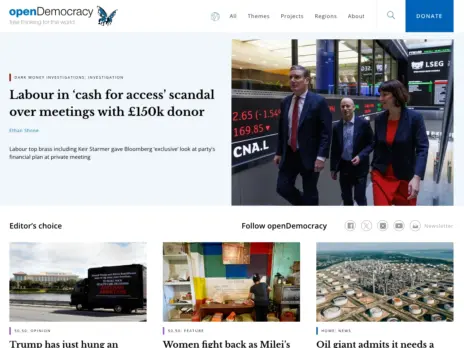Mr Justice Warby today demolished the libel case brought by former MP Tim Yeo and sided pretty much 100 per cent behind The Sunday Times.
He ruled the paper's report that Yeo was prepared to act as a paid Parliamentary advocate for a Far East solar energy company was true and that it was based on responsible journalism.
He was clearly impressed by the testimony of Sunday Times Insight editor Jonathan Calvert and his former deputy Heidi Blake. And he described Yeo’s evidence as “dishonest” in places.
More than two years after the initial piece was published, on 9 June 2013, Yeo faces paying at least £400,000 in costs to The Sunday Times, as well as his own legal fees which will have been considerable.
As Sunday Times editor Martin Ivens said today: “This is a victory for investigative journalism. It vindicates the role of the press in exposing the clandestine advocacy by MPs for undisclosed interests."
The judgment notes that Yeo made £80,700 a year from his work as an MP. His various outside interests included work as a non-executive director of various energy-related companies which earned him just under £200,000 a year.
He was snagged by The Sunday Times after Blake emailed him on 13 May 2013 claiming to represent a “leading edge solar technology developer in the Far East”. She claimed to be offering “an extremely generous remuneration package including a quarterly bonus”.
There followed a lunch meeting between Blake, Calvert and Yeo in which they posed as lobbyists and which formed the basis for the story.
Yeo was “fronted up” about the story shortly after 9pm on the Friday before publication and given until 4pm the following day to respond.
Interestingly, Judge Warby ruled that this was a reasonable length of time for him to respond.
He said: “A story of this kind, containing what for this purpose I assume to be information which the public is entitled to receive, is not of such special urgency as to make it necessary to provide a short period for pre-publication comment. Such a story is however peculiarly vulnerable to having its impact undermined by spoiling tactics. The subject of the story has a strong incentive to engage in tactics of that kind, and so do competitors.
"The risks are exacerbated if the story is objectively sensational and the subject is someone, such as an experienced MP, well versed in the mechanisms for managing or influencing the news. If the impact of such a story is dissipated the public interest is harmed. It attracts less attention, and there is some waste of the resources of the media organisation that has created it.
"That represents a disincentive to investigative journalism of this kind. Fairness to the subject has to be balanced against these factors. I do not regard the judgment made in this instance as open to criticism as irresponsible. It is noteworthy that a very thorough response was possible in the event, even though it put Mr Yeo and his lawyers to some real inconvenience to provide it.”
In general he said: “In my judgment the interpretations the journalists gave to what Mr Yeo said during this meeting were reasonable ones, reasonably arrived at.”
Yeo claimed in evidence that: “As far as I was concerned, this meeting was about learning about this technology.”
But the judge said: “I am quite unable to accept this evidence. I accept that Mr Yeo is genuinely interested in green technology, and that he has given advice and help to some in this field without seeking or accepting any material reward.
“However, the 13 May email was short and clear. It was plainly suggesting a consultancy with generous remuneration. It is not credible that this was not present to Mr Yeo’s mind at all.
“Experience suggests that in general those who are not interested in money tend not to get much. I can think of none who convincingly claim to have no interest in money, yet end up with an annual income in excess of £200,000. I do not consider that Mr Yeo is such a person. In my judgment this evidence was untrue. I am not persuaded that it was honest either.
“In my judgment Mr Yeo went to the meeting knowing full well that its purpose was to discuss the prospect of a consultancy, involving work for which the client was prepared to pay generously.”
He said: “Mr Yeo, in my judgment, expressed a willingness to undertake Parliamentary advocacy.”
While this is encouraging for those who value press freedom it is worth noting that this freedom comes with a hefty price tag. Few publishers could, like News UK, afford to spend hundreds of thousands of pounds to engage in years of litigation to defend true stories on matters of public interest.
It makes the case all the more urgent press regulator IPSO to set up an arbitration scheme so that libel disputes like this can be settled quickly and inexpensively in future.
Most publications when faced with Yeo's legal might would have caved in long before trial and apologised for pragmatic reasons. And given the huge expense and distraction of defending a case like this, there must be a chilling effect deterring publications from engaging in this sort of important public interest journalism.
Email pged@pressgazette.co.uk to point out mistakes, provide story tips or send in a letter for publication on our "Letters Page" blog






